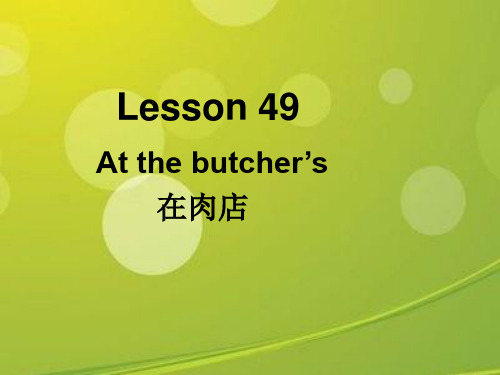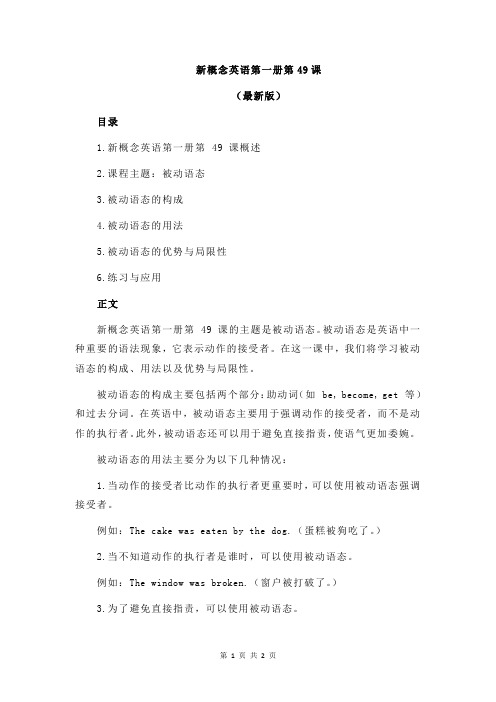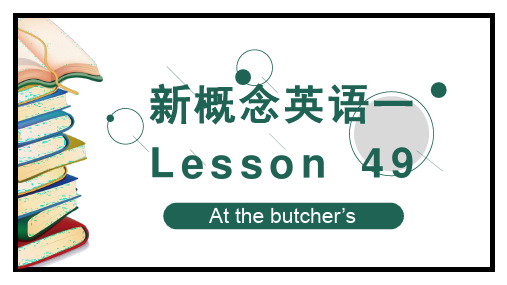新概念第一册49课
新概念第一册49课

一般现在时
肯定结构
1.主语 + be +其它. 如:It is cold today.
2.主语 + 动词原形+其它 如:I want an apple.
3.主语 + 动词+s/es(第三人称单数作主语时) 如: She likes apples.
否定结构
1.主语 + be + not+其它. 2.主语 + don’t + 动词原形 3.主语 + doesn’t+ 动词原形
4. She lives in a small town near New York. (改为一般疑问句)
Does she live in a small town near New York?
三、选择题。
(C)1.-- _____Ann like beer?
--Yes, ______. A. Does, he do. B. is, she is. C. Dose, she does.
~ the time in English 用英语报时 ~ a lie撒谎 ~ the truth说实话 2)truth n.实情 true adj.真实的
3)either“也” 用于否定的情况,位于句末
too “也”用于肯定的情况,位于句末
• I don’t like chicken__e_it_h_er_ ! • He likes smoking and I like it_t_o_o_.
A. likes, doesn’t B. don’t like, do C. likes, didn’t
(A) 5. Lucy doesn’t want____ any bread. She feels like _____some
新概念第一册Lesson49-50

tell sb to do sth. 告诉某人做某事 1.Tom的妈妈告诉他去清洁卧室。 Tom's mom tells him to clean the bedroom. 2.我的姐姐告诉我去买一些牛排。 My sister tells me to buy some steak.
3.老师告诉我们去做我们的家庭作业。 The teacher tells us to do our homework. 4.她的妈妈告诉她不要看电视。 Her mother tells her not to watch TV.
eg. The teacher tell you to remember this sentence. You should tell him to clean the floor.
1. 我妈妈叫我去做作业。 eg. My mother tell me to do the homework.
tell sb not to do sth. 告诉某人不要做某事 eg. My father tell me not to play the computer
Text
• BUTCHER: Do you want any meat today, Mrs.Bird?
• MRS. BIRD: Yes, please. • BUTCHER: Do you want beef or lamb? • MRS. BIRD: Beef,please. • BUTCHER: This lamb's very good. • MRS. BIRD: I like lamb, but my
1.我要给孩子们讲这个故事。 eg. I will tell the children this story.
新概念英语第一册第49课

新概念英语第一册第49课摘要:1.课文背景介绍2.重点词汇和语法解析3.实用口语表达4.练习与拓展方法正文:一、课文背景介绍新概念英语第一册第49课(Lesson 49)的标题为“A visit to a factory”,讲述了一位参观者来到一家工厂参观的过程。
参观者对工厂的各个环节产生了浓厚兴趣,向工厂主人询问了有关产品、生产过程和员工福利等问题。
通过这次参观,参观者对这家工厂有了更加深入的了解。
二、重点词汇和语法解析1.词汇(1)factory:工厂(2)production:生产(3)machine:机器(4)employee:员工(5)benefit:福利2.语法本课的语法重点为一般现在时和一般过去时的被动语态。
例如:- The products are made in our factory.(产品在我们的工厂里制造。
)- The machines are operated by the employees.(机器由员工操作。
)三、实用口语表达1.询问:- What kind of products do you produce?(你们生产什么类型的产品?)- How do you operate the machines?(你们如何操作机器?)2.介绍:- This is our factory.(这是我们的工厂。
)- These are the products we produce.(这些都是我们生产的产品。
)3.表达兴趣:- I"m really interested in your factory.(我对你们的工厂非常感兴趣。
)- It"s fascinating to see the production process.(看到生产过程真是令人着迷。
)四、练习与拓展方法1.朗读课文,模仿标准发音。
2.按照课文内容,和朋友或家人角色扮演,进行口语练习。
3.搜集有关工厂的图片或视频,结合课文内容制作PPT,进行presentation。
新概念英语第一册第49课

新概念英语第一册第49课(最新版)目录1.新概念英语第一册第 49 课概述2.课程主题:被动语态3.被动语态的构成4.被动语态的用法5.被动语态的优势与局限性6.练习与应用正文新概念英语第一册第 49 课的主题是被动语态。
被动语态是英语中一种重要的语法现象,它表示动作的接受者。
在这一课中,我们将学习被动语态的构成、用法以及优势与局限性。
被动语态的构成主要包括两个部分:助动词(如 be, become, get 等)和过去分词。
在英语中,被动语态主要用于强调动作的接受者,而不是动作的执行者。
此外,被动语态还可以用于避免直接指责,使语气更加委婉。
被动语态的用法主要分为以下几种情况:1.当动作的接受者比动作的执行者更重要时,可以使用被动语态强调接受者。
例如:The cake was eaten by the dog.(蛋糕被狗吃了。
)2.当不知道动作的执行者是谁时,可以使用被动语态。
例如:The window was broken.(窗户被打破了。
)3.为了避免直接指责,可以使用被动语态。
例如:The mistake was made by him.(错误是他犯的。
)被动语态的优势在于可以强调动作的接受者,使句子更加客观、委婉。
然而,被动语态也有局限性,它不能表示所有的动作,例如一些不及物动词和动词短语不能用于被动语态。
在学习被动语态后,我们需要进行大量的练习和应用,以巩固所学知识。
可以通过阅读、写作和口语练习,不断提高自己的英语水平。
总之,新概念英语第一册第 49 课让我们了解了被动语态的构成、用法和优势与局限性。
新概念第一册49课课件

详细描述
在课堂互动游戏中,学生可以通过参与游戏的方式学习课程内容,例如通过单词接龙、猜谜语等方式 巩固所学词汇和语法知识。这种方式可以让学生在轻松愉快的氛围中学习,提高学习效果。
THANKS
填空题2
请根据所给图片填写合适的英文 单词。图片中是一张正在听音乐的 CD,应填写“listening”。
翻译题
翻译题1
请将中文句子“我正在读书”翻译成英文。正确的英文句子 是“I am reading a book”。
翻译题2
请将中文句子“他正在游泳”翻译成英文。正确的英文句子 是“He is swimming”。
03
扩展阅读
相关文章推荐
01
02
49课详 解》
文章2
《新概念英语第一册49课的 语法重点》
文章3
《新概念英语第一册49课的 词汇解析》
文章4
《新概念英语第一册49课与 生活实际联系》
背景知识介绍
01
02
03
英语国家文化背景
介绍与新概念第一册49课 相关的英语国家文化背景, 如风俗习惯、历史背景等。
重点词汇
important: 重要的
please:请
would:愿 意
shall:应该
could:可 以
let:让
语法点解析
本课重点讲解了“请求”和“建议”的表达方式,包括使用情态动词“could”、 “would”、“shall”和“let”等。
通过例句和练习,让学生掌握这些情态动词在表达请求和建议时的用法和区别。
选择题
D. This is a yellow house. 选择题2: 请从下列四个选项中选出与图片匹配的英文单词。
Lesson49(知识清单)新概念英语第一册

新概念英语第一册Lesson 49笔记单词讲解:❥❥butcher ['bʊtʃə] n. 卖肉者at the butcher's 在肉店at the doctor's 在诊所at the hairdresser's 在理发店at the baker's 在面包店go to the butcher's 去肉店这里都省略了shopThe butcher is cutting the meat. 屠夫正在切肉。
The butcher's knife is very sharp. 屠夫的刀特别锐利。
❥❥meat [miːt] n. (食用〕肉(不行数名词〕pork [pɔːk] n. 猪肉I don't eat meat. 我不吃肉。
beer [bɪə] n. 啤酒❥❥lamb [læm] n. 小羊;羔羊肉mutton ['mʌtn] n. 羊肉❥❥husband ['hʌzbənd] n. 丈夫husband and wife: 夫妻exhusband: 前夫He's a good husband and father. 他是一个好丈夫和父亲。
夫妻之间的称呼:honey dear darling baby sweetheart❥❥steak [steɪk] n. 牛排a piece of steak 一块牛排How do you like your steak?你想怎样吃你的牛排?Steak rare/medium/welldone.生些/五分熟/全熟。
❥❥mince [mɪns] n. 肉馅I want a pound of mince, because I want to make some dumplings. 我想要一磅肉末,由于我想做一些饺子。
❥❥chicken ['tʃɪkɪn] n.鸡;鸡肉hen [hen] n. 母鸡cock [kɒk] n. 公鸡❥❥tell [tel] v. 告知tell sb. sth. 告知某人某件事tell the truth: 说实话tell a story: 讲故事tell a joke: 讲笑话She's telling a story to the children. 她正在给孩子们讲故事。
新概念英语第一册Lesson49-50Atthebutcher's课件

Language Point
语句讲授、课文讲授
如果是疑问的语气 , 怎么表达? — Do you like coffee? — Yes, I do. / Yes, I like coffee. e.g. — Does she like coffee?
— Yes, she does. / Yes, she likes coffee. — Does he want a new schoolbag? — No, he doesn't.
B. do D. doesn't
查看答案解析
答案:do 解析: 考查疑问句回答 第一因为是Yes,所以是肯定回答,排除don't和doesn't;其次I是第一人称单数,后面要跟do; 译文:“你想要些土豆吗?” “是的 , 我想要。”
下一题
— Does Sam like cabbage? — Yes, he ______ .
Language Point
语句讲授、课文讲授
如果是否定的语气 , 怎么表达? 实义动词来做谓语动词 , 应根据主语来加助动词 , 然后在 后面踉上动词原形。 e.g. I like green. → I don't like green.
He likes green. → He doesn't like green. I want a cup of tea. → I don't want a cup of tea. She wants a cup of tea. → She doesn't want a cup of tea.
把do变成does。 e.g. He / She / It does.
否定语气:doesn't + 实义动词原形。 e.g. doesn't like / want
新概念英语第一册49课课文原文

新概念英语第一册49课课文原文Lesson 49 A noble gangsterOne of the most powerful gangsters in Chicago before the start of World War II was Al Capone. He was born in Italy in 1899. His father was a hairdresser and his mother was a seamstress. When Capone was 11 years old, he joined a street gang. At the age of 14, he became the leader of a small group of young criminals. Capone was sent to prison for the first time at the age of 15 for carrying a concealed weapon.After serving a few months in prison, Capone moved to Chicago and started working for Johnny Torrio, a well-known gangster at the time. Torrio taught Capone about the illegal activities that were taking place in Chicago, such as gambling, prostitution, and bootlegging. Capone quickly rose through the ranks and became one of Torrio's most trusted men. When Torrio retired, Capone took over as the leader of the gang.Under Capone's leadership, the gang became extremely powerful and influential. They controlled many illegal businesses in Chicago and made millions of dollars. Capone was known for his violent ways and his ability to eliminate anyone who crossed him. However, he also had a reputation for being generous towards the poor. During the Great Depression, Caponeopened up soup kitchens and distributed food to the needy. Many people in Chicago saw him as a modern-day Robin Hood.Capone's reign of terror eventually came to an end when he was convicted of tax evasion in 1931. He was sentenced to 11 years in prison and was released on parole in 1939 due to his deteriorating health. He spent his remaining years in Florida before dying in 1947.Al Capone's life is a fascinating example of how a criminal can simultaneously be seen as both ruthless and generous. Despite his illegal activities, he was admired by some for his charitable acts, especially during times of hardship. This paradoxical nature has made Capone a legendary figure in the history of organized crime.。
新概念英语第一册第49课

Lesson 49-At the Butcher's文本BUTCHER: Do you want any meat today.Mrs. Bird?MRS.BIRD:Yes, please.BUTCHER: Do you want beef or lamb?MRS.BIRD:Beef, please.BUTCHER:This lamb's very good.MRS.BIRD: I like lamb,but my husband doesn't. BUTCHER: What about some steak?This is a nice piece. MRS.BIRD:Give me that piece, please.MRS.BIRD: And a pound of mince, too.BUTCHER:Do you want a chicken,Mrs. Bird?They 're very nice.MRS.BIRD:No, thank you.MRS.BIRD: My husband likes steak,but he doesn't like chicken.BUTCHER:To tell you the truth,Mrs. Bird,I don't like chicken either!参考译文肉商:您今天要买点肉吗,伯德夫人?伯德夫人:是的,我买一点。
肉商:您要牛肉还是要羔羊肉?伯德夫人:请给我牛肉。
肉商:这羔羊肉很好。
伯德夫人:我喜欢羔羊肉,可我丈夫不喜欢。
肉商:来点牛排吗?这块很好。
伯德夫人:就请给我那块吧。
伯德夫人:再来一磅绞肉。
肉商:您要买只鸡吗,伯德夫人?这些鸡很好。
伯德夫人:不要了,谢谢。
伯德夫人:我丈夫喜欢牛排,但他不喜欢鸡。
肉商:说老实话,伯德夫人,我也不喜欢鸡。
生词和短语课文详解1. At the butcher's.【译文】在肉店。
新概念英语第一册第49-50课lesson49-50课件

Yes
2.Mrs. Bird’s husband like lamb tNooo.
3. Mrs. Bird like chicken.
No
4.Mrs. Bird doesn’t like chicken. Yes 5. Mrs. Bird’s husband doesn’t likeNsoteak
Detailed study about the passage
or 或者,还是(表示选择)
❖ Do you want beer or wine ? ❖ Beer , please . ❖ Wine , please .
❖ Do you want an apple or a banana ? ❖ An apple , please . ❖ A banana , please .
A. speak B. talk C. say D. tell
❖ either adv(也) My husband likes steak . I like steak too .=I also like steak .
My husband doesn't like chicken, I don't like chicken either .
New Concept English(Book 1) (新概念英语)(第一册)
Have you ever been there?
butcher
❖ ---Do you eat meat every day? ❖ 你每天都吃肉吗? ❖ --- _____________.
Lesson 49 At the butcher’s
New Words and Expressions
butcher meat beef lamb husband steak
新概念英语第一册第49课课件(共19张PPT)

1.我喜欢Tank.
I like Tank. 2. 她喜欢Tank. She likes Tank.
3. 我不喜欢Sonic.
I don’t like Sonic. 4. 她不喜欢Sonic.
She doesn’t like Sonic.
don’t = do not doesn’t = does not
Lesson 49 At the butcher’s
Have you been there?
butcher
New words
butcher 屠夫,卖肉的
He is a real butcher! I have to go to the butcher’s. doctor – doctor’s
the price again. 实话说,这个牛排不是很好。
either adv.也(用于否定句)
Analyze of the passage
1.Do you want beef or lamb? or 或者,还是(表示选择) Do you want tomatoes or potatoes? 要钱要命? 给我块面包或者牛排。
实话说,他真的很笨哦! 其实,我也不喜欢吃鱼。
Grammar
助动词 do, does
在英语中,助动词一般没有词 义,主要帮助构成谓语,表示 时态,语态或构成疑问及否定。
do :主语为 I, you及复数时。 do not = don’t (否定形式) does :主语为第三人称单数时。 does not = doesn’t (否定形式)
2.What about some steak? 来点牛排怎么样?
=how about 怎么样?/如何? -You don’t like beef? What about
Lesson49Atthebutcher's(课件)新概念英语第一册

too either too either
either
Grammar- 定义
I am a teacher.
一般现在时 说明情况
I read books every day. 常做
The sun rises in the east. 真理
主语+be动词/动词+其他。
It is sweet.
主语 be动词 其他。
破擦音 清辅音 /ts/ /tʃ/ /tr/ 浊辅音 /dz/ /dʒ/ /dr/
Thank you !
What about some steak? This is a nice piece.
st ea k min ce
No,thank you.
Do you want a chicken,Mrs.Bird ? They are vere nice.
chi ck en st ea k min ce
Is he tall?
肯定句 否定句 一般疑问句
They are happy.
主语 be动词 其他
They are not happy.
肯定句 否定句
Are they happy ?
一般疑问句
I like lamb.
非三单主语 动原 其他
I don’t like lamb.
肯定句 否定句
Do you like lamb ? 一般疑问句
Does he go to school ? 一般疑问句
He likes milk.
三单主语 动三单 其他
He doesn’t like milk.
Does he like milk ?
肯定句 否定句 一般疑问句
新概念英语第一册第49课.ppt

every afternoon. 7.At eight at night, she __________(watch) TV
with his parents.
Lesson 49
At the butcher’s
Review
• like • want • ripe • choice • pure • fresh
butcher n. 卖肉的,屠夫
• at the butcher’s • at the + 职业’s • 诊所 • at the doctor’s • 老师办公室 • at the teacher’s
No, 主 doesn’t.
一、动词第三人称单数的变化 1、+S
stop-stops ,make-makes 2、以辅音字母加“y”结尾,把“y”变为“i”, 加 “es”
study-studies [z]; worry-worries 3、以“s, x, ch, sh”结尾的,在词尾加 “es”,
The End
• 9、春去春又回,新桃换旧符。在那桃花盛开的地方,在这醉人芬芳的季节,愿你生活像春天一样阳光,心情像桃花一样美丽,日子像桃子一样甜蜜。 2020/7/242020/7/24Friday, July 24,力成正比例。2020/7/242020/7/242020/7/247/24/2020 2:29:52 PM
2.He _____ (get) up at six o’clock. 3.______you ______(brush) your teeth every
新概念第一册49课精美课件

lift that chair,but I can’t lift this table.(lift) 5.I can ____
6.Can you jump ____ off that wall?(jump)
Let’s recite
y n y
y
y
n
y
y
• L 49 • At the butcher’s
1.That boy is running _____ across the road.(run)
give us a speech.(give) 2.Mr.Li is going to ____ makingthe bed.(make) 3.My mother is _____
Sweep (sweep) the floor and ____(dust) dust 4.____ the sideboard.
steak
[steik] n. 牛排
Do you want any……?
chicken
lamp
[læ mp] n.
New words and expressions
• butcher n.卖肉的(人) • at the butcher ’s 在肉店 • at+ the +职业’s (该职业人员工作的场所) • at the doctor ’s 在诊所(在医院) • at the hairdresser ’s 在理发店
单项选择 D 1. — Can Mary play soccer? — ____. A. Yes, she is B. No, she doesn’t C. Yes, she does D. No, she can’t C 2. I don’t ___a tennis racket, but Kate ___one. A. has;have B. have;have C. have;has D. has; has
新概念第一册课文翻译及学习笔记【Lesson49、51、53】

【导语】新概念英语作为⼀套世界闻名的英语教程,以其全新的教学理念,有趣的课⽂内容和全⾯的技能训练,深受⼴⼤英语学习者的欢迎和喜爱。
为了⽅便同学们的学习,为⼤家整理了⾯的新概念第⼀册课⽂翻译及学习笔记,希望为⼤家的新概念英语学习提供帮助!Lesson49【课⽂】 BUTCHER: Do you want any meat today. Mrs. Bird? MRS.BIRD: Yes, please. BUTCHER: Do you want beef or lamb? MRS.BIRD: Beef, please. BUTCHER: This lamb's very good. MRS.BIRD: I like lamb, but my husband doesn't. BUTCHER: What about some steak? This is a nice piece. MRS.BIRD: Give me that piece, please. MRS.BIRD: And a pound of mince, too. BUTCHER: Do you want a chicken, Mrs. Bird? They 're very nice. MRS.BIRD: No, thank you. MRS.BIRD: My husband likes steak, but he doesn't like chicken. BUTCHER: To tell you the truth, Mrs. Bird, I don't like chicken either! 【课⽂翻译】 ⾁商:您今天要买点⾁吗,伯德夫⼈? 伯德夫⼈:是的,我买⼀点。
⾁商:您要⽜⾁还是要羔⽺⾁? 伯德夫⼈:请给我⽜⾁。
⾁商:这羔⽺⾁很好。
伯德夫⼈:我喜欢羔⽺⾁,可我丈夫不喜欢。
⾁商:来点⽜排吗?这块很好。
- 1、下载文档前请自行甄别文档内容的完整性,平台不提供额外的编辑、内容补充、找答案等附加服务。
- 2、"仅部分预览"的文档,不可在线预览部分如存在完整性等问题,可反馈申请退款(可完整预览的文档不适用该条件!)。
- 3、如文档侵犯您的权益,请联系客服反馈,我们会尽快为您处理(人工客服工作时间:9:00-18:30)。
3)either“也” 用于否定的情况,位于句末
too “也”用于肯定的情况,位于句末
• I don’t like chicken__e_it_h_er_ ! • He likes smoking and I like it_t_o_o_.
New words and expressions
1 butcher [ b t ə] n.卖肉的 2 meat [mi:t] n.(食用)肉 3 beef [bi:f] n.牛肉 4 lamb [læ m] n.羔羊肉 5 husband [ hʌzbənd] n.丈夫 6 steak [ste k] n.牛排 7 mince [m ns] n.肉馅,绞肉 8 chicken [ tʃ k n] n.鸡 9 tell [tel] v.告诉 10 truth [tru: ] n.实情 11 either [ a ðə] ad.也(用于否定句)
husband doesn’t like lamb. 用but 连接的并列句,在后一半句中可以省略与前半中相同的谓语动词和
宾语。
S2:Do you want beef↑ or lamb↓?
• or “或者”表选择 • 选择疑问句↑ or ↓ ?
S3: What about some steak?
• What about…? …怎么样? • What about…?=How about…?
S4: To tell you the truth, Mrs. Bird, I don’t like chicken either!
• to tell you the truth 实话跟你说
1)tell v. 告诉 tell sb sth 告诉某人某事 tell sb to do sth. 告诉某人做某事
A. likes, doesn’t B. don’t like, do C. likes, didn’t
(A) 5. Lucy doesn’t want____ any bread. She feels like _____some
water. A. to eat, drinking B. to eat, to drink C. eating, drinking
Monday?
3. What time___d_o_e_s___his mother____d_o___(do) the housework? 4. __D_o__you _b_r_u_s_h_(brush) your teeth every morning?
二 按要求改写句子。
1 Do you often play football after school? (肯定回答)
Questions:
1. What does Mrs. Bird want at the butcher's?
2. Which kind of meat does she like? 3. How about her husband? 4. This lamb is nice. Dose Mrs. Bird like it?
S1: I like lamb, but my husband doesn’t.
1) but 表示转折,意为“但,然而,尽管如此” e.g.他不喜欢音乐,可他的妻子却很喜欢。 He doesn’t like music, but his wife does. 2) 句中的doesn’t 后面省略了like lamb. 整句应为I like lamb, but my
Yes,I do.
2. I have many books. (改为否定句)
I don’t have many books.
3. Gao Shan’s sister likes playing table tennis. (改为否定句)
Gao Shan’s sister doesn’t like playing table tennis.
变为否定句:1.It is not cold today. 2. I don’t want an apple. 3. She doesn’t like apples.
一般现在时
一般疑问句 1.把be动词提前 2. Do +主语+动词原形? 3.第三人称单数作主语时, Does+主语+动词原形 ? 练习:把下列句子变为疑问句。
一般现在时
肯定结构
1.主语 + be +其它. 如:It is cold today.
2.主语 + 动词原形+其它 如:I want an apple.
3.主语 + 动词+s/es(第三人称单数作主语时) 如: She likes apples.
否定结构
1.主语 + be + not+其它. 2.主语 + don’t + 动词原形 3.主语 + doesn’t+ 动词原形
(A) 6. Would you like_______?
A. some juice B. any juice C. some juices
(A) 7. I don’t like oranges _____apples.
A. and B .or C. so
(B) 8. _______boy is very hungry. Give him _______large hot dog.
What about sth.? 某物怎么样?
What about doing sth.?做某事怎么样? 练习:1. 来杯咖啡怎么样?
____W__ha_t _ab_o_ut_a_c_up_o_f_co_ff_e_? _
2. 打篮球怎么样?
____W__ha_t_a_bo_u_t_pl_ay_i_ng_b_a_sk_e_tball?
特殊疑问句:特殊疑问词+一般疑问句? 她喜欢什么?
__W__h_a_t_d_o_e_s_s_h_e__li_k_e_?__
一 用动词的适当形式填空。
1. __D__o_e_s__ Mike___r_e_a_d__(read) English every day? 2. How many lessons___d_o_e_s___your classmate__h_a_v_e___(have) on
1.It is cold today. __I_s__it_c_o_ld__to_d_a_y_?______ 2. I want an apple. __D__o_y_o_u__w_a_n_t _a_n_a_p_p_l_e_? 3. She likes apples. __D__o_e_s_s_h_e_l_ik_e__a_p_p_le_s_?_
4. She lives in a small town near New York. (改为一般疑问句)
Does she live in a small town near New York?
三、选择题。
(C)1.-- _____Ann like beer?
--Yes, ______. A. Does, he do. B. is, she is. C. Dose, she does.
Lesson 49
At the butcher’s 在肉店
meat[mi:t] n.(食用)肉
mince[m ns] n.肉馅பைடு நூலகம்绞肉
beef
[bi:f] 牛肉
steak
[ste k] 牛排
pork
[p k] 猪肉
lamb
[læ m] 羊羔; 羔羊肉
chicken
[ tʃ k n] 鸡(C)鸡肉(U)
A. The, the B. The, a C. A, the
LESSON 50
1 tomato [tə mɑ:təu] n.西红柿 2 potato [pə te təu] n.土豆 3 cabbage [ kæ b dʒ] n.卷心菜 4 lettuce [ let s] n.莴苣 5 pea [pi:] n.豌豆 6 bean [bi:n] n.豆角 7 pear [peə] n.梨 8 grape [gre p] n.葡萄 9 peach [pi:tʃ] n.桃
(A) 2. ____they want some jam?
A .Do B. Does C. Are
(B) 3. I______ like wine.
A. am not B. don’t C. doesn’t
(A) 4. My mother____ noodles, but my father_____.
